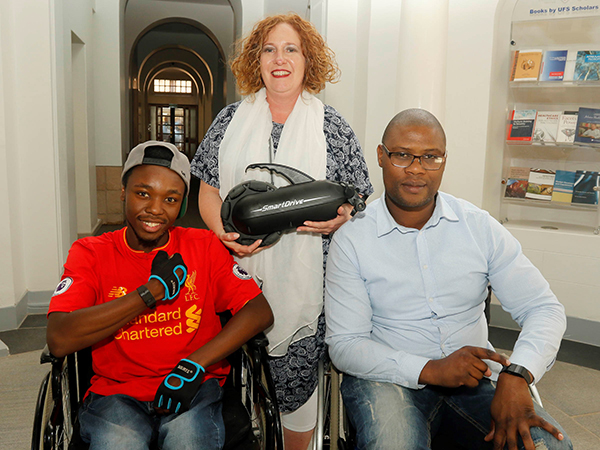Latest News Archive
Please select Category, Year, and then Month to display items
25 September 2024
|
Story Jacky Tshokwe
|
Photo Supplied
 Prof Louise Cilliers, University of the Free State (UFS) research fellow and former head of the Department of Classical Studies.
Prof Louise Cilliers, University of the Free State (UFS) research fellow and former head of the Department of Classical Studies.
Prof Louise Cilliers, one of our esteemed research fellows and former head of the Department of Classical Studies, has been awarded the prestigious 2024 UJ Translation Prize. Prof Cilliers received this accolade for her exceptional Afrikaans translation of the renowned Greek poet Konstantinos Kavafis' poetry collection, Van Alexandrië na Ithaka, published by Naledi.
Konstantinos Kavafis (1863-1933) is considered one of the most important literary figures in modern Greek poetry, known for his reflective and often philosophical poems that explore themes of history, identity, and human experience. In Van Alexandrië na Ithaka, Prof Cilliers brings the essence of Kavafis’ work to Afrikaans readers, carefully preserving the poet’s rich symbolism, historical depth, and emotional nuances.
Prof Cilliers has had a distinguished academic career, having served as head of the Department of Classical Studies. Her expertise in classical languages and literature, coupled with her passion for translation, made her an instrumental figure in making classical texts more accessible to a broader audience. This award is not only a testament to her scholarly achievements, but also to her dedication to the cultural and literary enrichment of the Afrikaans language.
The UJ Prize for Translation honours outstanding translations of literary works into any of South Africa’s official languages. Prof Cilliers' recognition continues the department's proud tradition of excellence in classical scholarship and language studies.
We extend our heartfelt congratulations to Prof Cilliers for this remarkable achievement and are excited to celebrate her continued contributions to the field of classical studies and translation.
About the UJ Translation Prize
The University of Johannesburg Translation Prize celebrates the best translations of literary works into any of South Africa’s official languages. It aims to promote high standards of literary translation and showcase the importance of bringing international literary voices into the local context through translation.
SmartDrive devices give UFS wheelchair users more independence
2017-12-01

From the left, are: David Mashape; Martie Miranda, Head of the
Center for Universal Access and Disability Support at the UFS;
and Lawrence Qamba, celebrating the recent acquisition
of two SmartDrive Power Assist devices.
Photo: Johan Roux
Students who make use of wheelchairs at the University of the Free State (UFS) will now be able to move around campus more independently than before. This is thanks to two SmartDrive Power Assist devices acquired by the university.
Accessibility is very important to the institution and with these devices clipping onto a manual wheelchair to make it motorised, students will not have to ask for help that often. It will assist them in overcoming obstacles they face every day.
Different surfaces pose different challenges
According to Martie Miranda, Head of the Center for Universal Access and Disability Support (CUADS), one of the most important advantages of the SmartDrive machines is that it enhances the independence of students. The devices were bought with funds received from the Department of Higher Education and Training specifically allocated for accessibility and infrastructure.
“While the UFS is addressing inaccessibility on its campuses, which will take time, this will help to motorise wheelchairs for wheelchair users to move around more easily. Students can now move around independently without necessarily asking for help, for example, to get up very steep ramps.” Miranda says some surfaces, such as grass and gravel, has its own unique challenges for wheelchair users.
A few years coming
The SmartDrive devices are operated by a Bluetooth watch. By tapping twice on the chair or clapping twice, the motor propels the wheelchair forward and stops when tapped twice, while also braking with one’s hands. The speed can also be controlled by the user. The machines use rechargeable batteries, with a fully charged battery lasting up to 15 hours.
Acquiring the devices was a process of a few years, and CUADS is happy to finally employ them to the benefit of their students. Miranda says the determination and support of Prof Nicky Morgan, Vice-Rector: Operations, and the assistance of Nico Janse van Rensburg, Senior Director: Top Management, were instrumental in buying the devices.